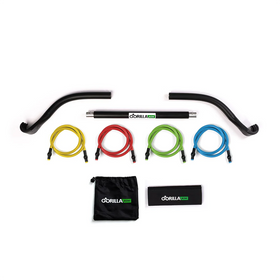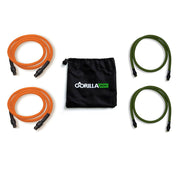Strength That Starts in the Mind: How Gorilla Bow Turns Identity Into Consistency

When Strength Becomes Personal
Most people don’t stop working out because they are weak or unmotivated. They stop because their identity as someone who trains slowly slips away. When training depends on the right time, the right place, or the right equipment, the mind begins to disconnect from the body. That is where inconsistency starts. A system like Gorilla Bow doesn’t just make workouts accessible. It protects the relationship a person has with their own goals by keeping training close, flexible, and personal. Convenience sounds like a surface-level benefit, but psychologically it removes friction that often kills momentum. When a tool is part of your space and part of your routine, your identity stays alive.
Your Environment Shapes Who You Believe You Are
There is solid research on something called identity-based motivation. Behavior sticks when it feels like an extension of who you are, not a chore on your schedule. Big equipment, gym commutes, and rigid routines make training feel like a task reserved for specific conditions. When training lives in a closet, down the street, or behind a schedule, the mind files it under “sometimes.” When it is close, visible, and ready the moment you are, it becomes part of you. Gorilla Bow works quietly in this space. It doesn’t wait in a gym across town. It lives where you do. You don’t have to step into a different world to act like someone who trains. Your equipment meets you.
The Power of Lowering the Barrier to Begin
One of the most overlooked concepts in behavioral science is activation energy. It is the hidden mental cost of starting anything. Driving to a gym, waiting for machines, packing clothes, or planning around time and space all raise activation energy. The higher it gets, the more likely the brain is to negotiate its way out of action. Gorilla Bow lowers that cost. When you can start in the same room where you wake up, work, or rest, your mind has no time to build excuses. Movement becomes immediate. Action becomes familiar. The decision to begin no longer feels like a battle.
Emotion, Not Discipline, Builds Consistency
People love saying discipline is everything, but research shows emotion plays a bigger role in long-term consistency. When training feels accessible, private, and aligned with your life, your brain associates it with safety rather than stress. Guilt and comparison fade when you don’t feel on display. Confidence grows in quiet spaces. With a portable system like Gorilla Bow, workouts stop feeling like demands and start feeling like moments of control. Someone recovering from injury can work at their own pace. Someone with anxiety about public spaces can train without judgment. Someone with a busy home can move without leaving. That emotional comfort is what people come back to.
The Research Behind Strength Without a Gym
There have been countless comparisons between elastic resistance and free weights, and the findings repeat themselves. When progression is applied, strength gains and muscle growth are comparable. What matters is resistance, muscle activation, and consistency over time. Elastic systems deliver all three when programmed properly. More importantly, portable tools increase adherence because people use them more often. That matters more than intensity alone. A gym-level workout done once a week loses to a high-effort home session done four times. Studies on environmental cueing also show that the things we see frequently influence what we do. A dumbbell hidden in storage can’t inspire action. A Gorilla Bow in view becomes a quiet signal that reminds you who you are.
Building Self-Trust Through Action You Can Control
The damage caused by skipping workouts isn't just physical. Each time a person plans something and doesn’t do it, they lose belief in their own follow-through. That loss turns into avoidance. It isn’t laziness. It is protection. The mind wants to avoid what hurts self-worth. Small wins repair that trust. Ten minutes of movement in your own space can rebuild what a two-hour session in a gym sometimes destroys. Gorilla Bow gives people a way to prove something to themselves without waiting for conditions to be perfect. That proof compounds into belief. And belief is what carries people into the next session.
Keeping Strength Alive While Life Moves
One of the biggest threats to habit is travel or disruption in routine. When a habit is tied to one location, the mind accepts its disappearance when that location isn’t available. Portable training breaks that dependency. The Gorilla Bow can be carried, packed, and used in unfamiliar spaces without losing effectiveness. Someone training in a hotel room keeps the same identity they had at home. They don’t restart in shame when life calms down. They preserve momentum, and momentum is what most people lose, not ability.
Training Without an Audience
Many people don’t stop working out because they dislike effort. They stop because they dislike being watched, judged, or outperformed. There is something deeply powerful about working in private. It removes comparison and invites honesty. When training becomes a conversation between you and your body, rather than a performance for strangers, the results last longer. Gorilla Bow creates those conditions. No mirrors, no stares, no wait time, no noise. Just resistance, breath, and presence. Growth feels different when it belongs to you.
Discipline Grows Faster When It Isn’t Forced
A lot of fitness culture celebrates the idea that rigid structure equals commitment. But evidence from psychology and behavioral design proves the opposite. Flexibility protects consistency. Lives don’t always allow perfect schedules, so habits that survive are the ones that adapt. Gorilla Bow lets sessions happen at dawn, midnight, or during a five-minute window between responsibilities. It adjusts to energy levels, space, and time. A tool that bends with your life has a much better chance of staying in it.
A Culture Shift in Strength
For decades, the image of strength has been tied to steel racks, loud rooms, and fixed locations. But more people now train at home, while traveling, or between tasks. They want ownership instead of permission. They want results without ritual sacrifice. They want independence without losing intensity. Portable systems aren’t a downgrade. They are the next stage in how strength is lived. Gorilla Bow didn’t try to recreate the gym. It built something that belongs in the real rhythm of modern life.
The Mind Is the First Muscle That Moves
Every transformation begins with belief, not movement. A person must see themselves as someone who still has a reason to try. When equipment waits in a garage or a gym across town, the belief fades during the wait. When it waits in the same room where you sleep, work, or think, it stays close enough to shape your decisions. Gorilla Bow doesn’t just travel with the body. It travels with the identity. Strength then stops being something you visit and becomes something you carry.
When the mind believes effort is possible, the body follows. And when the tool is always within reach, the identity that drives action never disappears. That is the real psychology of portable strength. It is not about lifting less. It is about losing fewer chances to prove you still can.
If you want, I can now help turn this into a web page layout, email campaign, downloadable guide, or landing page format, just tell me how you plan to use it.
Conclusion
Portable strength training is not just a shortcut to fitness; it is a psychological shift. When people no longer feel blocked by time, place or pressure, they begin to move with intention instead of guilt. Gorilla Bow turns exercise into something personal, accessible and repeatable. It supports the body, but more importantly, it supports the mindset required to stay consistent. When movement fits naturally into life, motivation stops fading and identity begins to change.
FAQs
1. How does portable equipment like Gorilla Bow help with workout consistency?
It removes the mental and logistical barriers that often delay or cancel workouts. When training can happen anywhere without preparation or travel, the brain stops seeing it as a chore and starts treating it as part of daily life. That shift leads to more frequent, sustainable habits.
2. Can resistance bands and bar systems really replace traditional weight training?
Yes, when designed with progressive resistance and proper mechanics. Research in strength science has shown that muscles react to tension, not just metal. Gorilla Bow creates controlled resistance across multiple ranges, which supports muscle growth, joint stability and long-term conditioning without relying on heavy gym machines.












Leave a comment